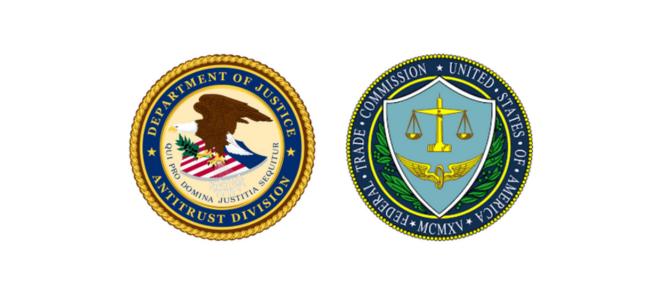FTC and DOJ Jointly Release New Draft Merger Guidelines

On July 19, 2023, the Federal Trade Commission (FTC) and the U.S. Department of Justice Antitrust Division (DOJ) jointly released a draft of proposed new merger guidelines. This draft will remain open for comment for a 60-day comment period ending on September 18, 2023.
These draft guidelines consolidate, revise, and replace the various versions of merger guidelines issued by the agencies since the DOJ’s first merger guidelines in 1968. The guidelines are built around 13 core principles that establish a framework for how the FTC and DOJ determine merger and acquisition deals’ compliance with antitrust laws. These 13 principles are as follows:
- Guideline 1: Mergers Should Not Significantly Increase Concentration in Highly Concentrated Markets.
- Guideline 2: Mergers Should Not Eliminate Substantial Competition between Firms.
- Guideline 3: Mergers Should Not Increase the Risk of Coordination.
- Guideline 4: Mergers Should Not Eliminate a Potential Entrant in a Concentrated Market.
- Guideline 5: Mergers Should Not Substantially Lessen Competition by Creating a Firm That Controls Products or Services That Its Rivals May Use to Compete.
- Guideline 6: Vertical Mergers Should Not Create Market Structures That Foreclose Competition.
- Guideline 7: Mergers Should Not Entrench or Extend a Dominant Position.
- Guideline 8: Mergers Should Not Further a Trend Toward Concentration.
- Guideline 9: When a Merger is Part of a Series of Multiple Acquisitions, the Agencies May Examine the Whole Series.
- Guideline 10: When a Merger Involves a Multi-Sided Platform, the Agencies Examine Competition Between Platforms, on a Platform, or to Displace a Platform.
- Guideline 11: When a Merger Involves Competing Buyers, the Agencies Examine Whether It May Substantially Lessen Competition for Workers or Other Sellers.
- Guideline 12: When an Acquisition Involves Partial Ownership or Minority Interests, the Agencies Examine Its Impact on Competition.
- Guideline 13: Mergers Should Not Otherwise Substantially Lessen Competition or Tend to Create a Monopoly.
The new merger guidelines are a significant departure from prior guidelines and align with the Biden administration’s stated goal of “robust and reinvigorated merger enforcement.” The guidelines overall reflect an increase in DOJ and FTC scrutiny of merger transactions and a willingness to pursue new enforcement theories in analyzing vertical and horizontal mergers.
These new guidelines are also in step with the Biden Administration’s trend of increased agency scrutiny of mergers, acquisitions and similar transactions involving healthcare providers. In July 2021, President Biden issued a sweeping Executive Order for the FTC and DOJ to take a closer look at consolidation in the healthcare industry, with specific mention of hospital mergers that have “left many areas, especially rural communities, without good options for convenient and affordable healthcare service.” Since the Executive Order was issued, both the DOJ and the FTC have withdrawn several previously-issued healthcare policy statements as “outdated” and “overly permissive.” The withdrawn policy statements, released in 1993, 1996 and 2011, had broadly outlined circumstances in which the DOJ and the Federal Trade Commission would or would not challenge transactions related to healthcare entities.
These changes to the antitrust enforcement landscape have significant application to healthcare providers, and the draft merger guidelines should be considered by providers entering into mergers, acquisitions, collaborations, joint ventures or other similar arrangements, including health systems, independent practice associations, physician organizations, Accountable Care Organizations and other value-based enterprises. As the 13 draft merger guidelines indicate, any analysis of antitrust risks and concerns of a merger will be highly dependent on the specific facts and circumstances of the arrangement.
Professional
If you have questions about the draft merger guidelines or their application to specific arrangements, please contact Robert F. Miller in Los Angeles, Maydha B. Vinson in San Francisco, or any other member of our Hooper, Lundy & Bookman team.

